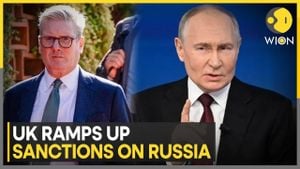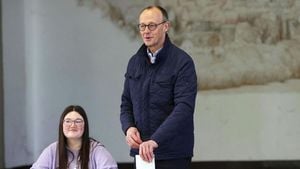Germany is witnessing a significant political shift following the 2025 federal election, where the Christian Democratic Union (CDU) and Christian Social Union (CSU) emerged as the clear victors, led by Friedrich Merz. This election has marked both triumph for the Union and disaster for the Social Democratic Party (SPD), which suffered its worst electoral performance since 1949.
According to projections from ARD and ZDF, the Union secured approximately 29 percent of the vote, reflecting a solid increase from their previous 24.1 percent performance. Merz confidently declared, "We have won the election," emphasizing his commitment to forming a functional government quickly. The election turnout was impressive, with estimates reaching between 83 and 84 percent, the highest level seen since German reunification.
Following the CDU and CSU, the Alternative for Germany (AfD) showed remarkable growth, expected to nearly double its share to around 20 percent. Despite some speculation about their potential performance, their rise reflects changing voter sentiments, especially within eastern regions where they soared past 30 percent. AfD leader Alice Weidel commented, "Our hand will always be outstretched for government participation," expressing readiness for collaboration.
Ominously for the SPD, under Chancellor Olaf Scholz, the party plummeted to approximately 16 percent, marking the lowest point in its history. Scholz acknowledged the grim results, stating, "This is the worst result for the SPD since 1949," and shouldering the blame for the party's failure. This disappointing turnout has raised questions about the party's future and its ability to regain trust from constituents.
Meanwhile, the Greens' support slightly decreased, landing between 12 and 13 percent. The Left Party made significant gains, surpassing the 5 percent threshold necessary for parliamentary representation, with their leader Jan van Aken exclaiming, "The Linke lives," amid celebrations from supporters. On the other hand, the Free Democratic Party (FDP) and the Bündnis Sahra Wagenknecht (BSW) faced uncertainty about their parliamentary presence, with projections showing them hovering around the required minimum.
The election outcome has initiated discussions about potential coalitions. Merz, now presenting himself as the frontrunner for chancellorship, has ruled out collaboration with the AfD, raising the stakes for coalition negotiations. Possible alliances could involve the Union teaming up with the SPD or the FDP, though the dynamics have shifted considerably following this election.
Compared to the previous election, which took place under the shadow of the pandemic, this election's campaigns primarily revolved around migration policies and economic recovery. These topics were brought to the forefront partly due to high-profile incidents like the Ashaffenburg stabbings, which fueled demands for stricter immigration policies. Merz called for changes, including the rejection of asylum seekers at borders, igniting controversy and debate.
Despite the challenges faced by parties like the SPD, the Linke, and new entrants like BSW, the overall political climate suggests significant shifts moving forward, with the Union's ascent overshadowing previous political landscapes. Observers noted the substantial plunge of the SPD compared to its results from just four years ago, where it obtained 25.7 percent of the vote.
With looming coalition talks and the need for rapid governmental formation, the coming weeks will undoubtedly test the mettle of party leaders across the spectrum. The SPD, facing internal questions about its future direction, must reassess its strategies and possibly shift paradigms to recover public confidence.
Political analysts anticipate intense negotiations as the Union seeks to form stable governance amid complex dynamics. The emergence of both the AfD and the Linke as prominent voices adds to the urgency, demanding from traditional parties responses to populism and social discontent.
Merz has signaled his intent to not just form any government but one capable of effective, immediate action. He stated, "I know about the responsibility," calling for urgency and efficiency as the nation looks toward its next chapter. This 2025 election unveils not just immediate outcomes but the foundation for Germany's future, especially as younger voters and changing demographics make their impact felt more significantly than ever.
Overall, the results from this election not only redefine the political makeup of the Bundestag but could potentially herald fundamental shifts in policy focus, electoral engagement, and coalition strategies across Germany.



